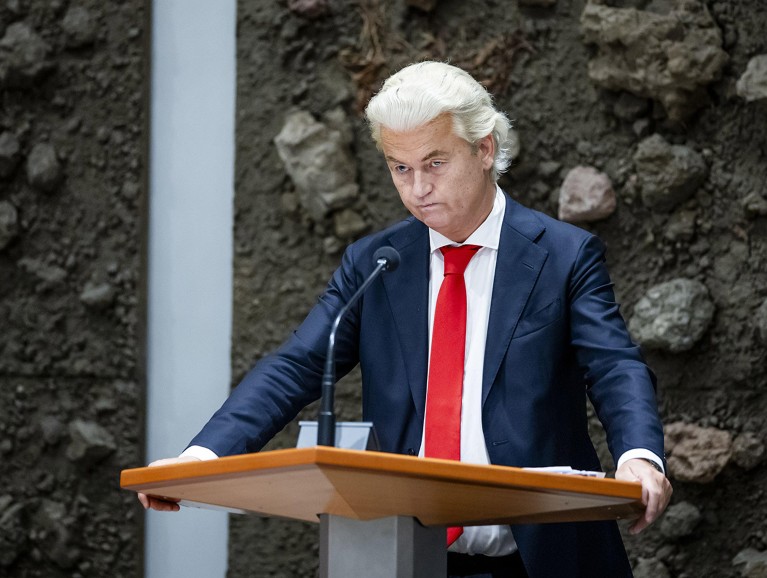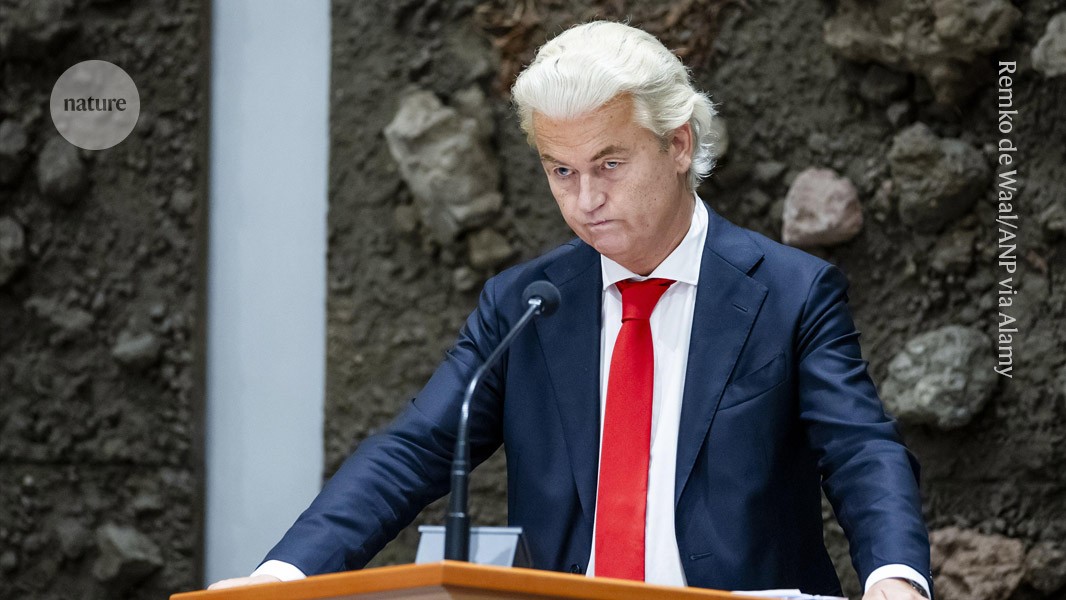
Far-right leader Geert Wilders heads the Dutch Party for Freedom (PVV), which is in a coalition government that is seeking cuts to the research budget.Credit: Remko de Waal/ANP via Alamy
A surge in far-right parties entering governments across Europe is raising concerns for science. The parties, whose focus is typically immigration, care little about research, say policy experts. In the Netherlands — where the Party for Freedom (PVV), led by the anti-Islam firebrand Geert Wilders, entered a coalition government in July — researchers are bracing for €1 billion (US$1.1 billion) in cuts to the budget, the worst in decades.
The US is the world’s science superpower — but for how long?
“We’re talking about historic cutbacks,” says Caspar van den Berg, president of the Universities of the Netherlands umbrella body. “It’s really striking how research, education, innovation is being hit the hardest of all sectors.”
Italy, Hungary, Slovakia and Croatia have also elected governments that include far-right parties. In June, populist parties made gains in the European Parliament elections. And in September, the far-right Freedom Party of Austria topped polls in a legislative election.
Although there are exceptions, these parties are typically not interested in research and innovation, says Léonie de Jonge, who specializes in far-right parties at the University of Groningen in the Netherlands, leaving scientists vulnerable to cuts.
Deep cuts
The Netherlands — which punches above its weight in global science — is among the nations seeing drastic changes to its research system. The government’s budget last month unveiled the nearly €1-billion-a-year cut to universities and research, slashing support for early-career research grants, open science and international students.
The cuts are the equivalent of scrapping around one large university in a country that has only 14, says van den Berg. Several universities have already frozen hiring over the summer. The University of Amsterdam has described the cuts as the biggest since the 1980s.
One of the budget’s biggest victims is starter and stimulus grants, introduced in 2022 to give new and existing academics a one-off €300,000 grant to hire PhD students and laboratory assistants, for example.
“The aim of those grants was to create room for independent, curiosity-driven research, but also to reduce work pressure,” says Eddie Brummelman, chair of the Young Academy, a science-policy group in Amsterdam. Dutch academics have repeatedly gone on strike in the past few years over heavy workloads.
But with these funds gone, young academics will be even more dependent on competitive grants from industry and the already oversubscribed Dutch Research Council (NWO), he says.
The NWO also faces cutbacks: the changes remove €30 million a year from its budget for scientific infrastructure. Its funds for open science are being halved.
In a separate set of cuts, the new government has scrapped the final tranches of the Netherland’s National Growth Fund, which supported green hydrogen projects and medical research, saving €6.8 billion.
Immigration focus
International students are also in the government’s crosshairs. The coalition wants their enrolment numbers to fall, and is slashing nearly €300 million from university education budgets to ensure this happens.
A spokesperson for the Ministry of Education, Culture and Science said that the government had chosen to prioritize security, health care and ensuring “that people have more money in their wallets” (the government is cutting personal taxes). “To make that possible, unfortunately, cutbacks are needed in many areas, including education and science.”
The Dutch Parliament is considering a ‘balanced internationalization’ law, designed to push back against the growth of English-language teaching and research, which has helped to attract international talent.
To universities’ alarm, if the law passes, all undergraduate courses would have to seek permission to be taught in English or another foreign language.
It’s so far unclear how many courses would be forced to switch to Dutch, says van den Berg. But the move could trigger an exodus of foreign academics who don’t want to, or can’t, teach in the language. “A drain of the most talented people is feared,” he says.
The policies align with the goals of parties whose central issue is immigration, says de Jonge. “That’s, at the end of the day, the one thing that they care about,” she says. “Their voters do not care about innovation.”
Although indifference towards research is one concern, such parties are often also hostile to universities, seen as a bulwark of left-wing “indoctrination”, she adds, making higher education a tempting target for cuts.
Science neglect
In Italy, where Prime Minister Giorgia Meloni’s right-wing Brothers of Italy party won power in 2022, university funding has effectively been cut this year by around €500 million, leaving a budget of roughly €9 billion, said a spokesperson for the Conference of Italian University Rectors. A government spokesperson countered that much of this drop is because funding was brought forward in 2023.
Neglect of science isn’t always confined to the far right. France’s new centre-right government has disappointed scientists by scrapping long-term budget increases, as it tries to lower government debt.
But the rise of far-right parties focused obsessively on immigration bodes particularly ill for research, says Robert-Jan Smits, president of the executive board of Eindhoven University of Technology in the Netherlands. “These are single-issue parties,” he says. On science, “they don’t really seem to care, and they don’t have a policy”.



